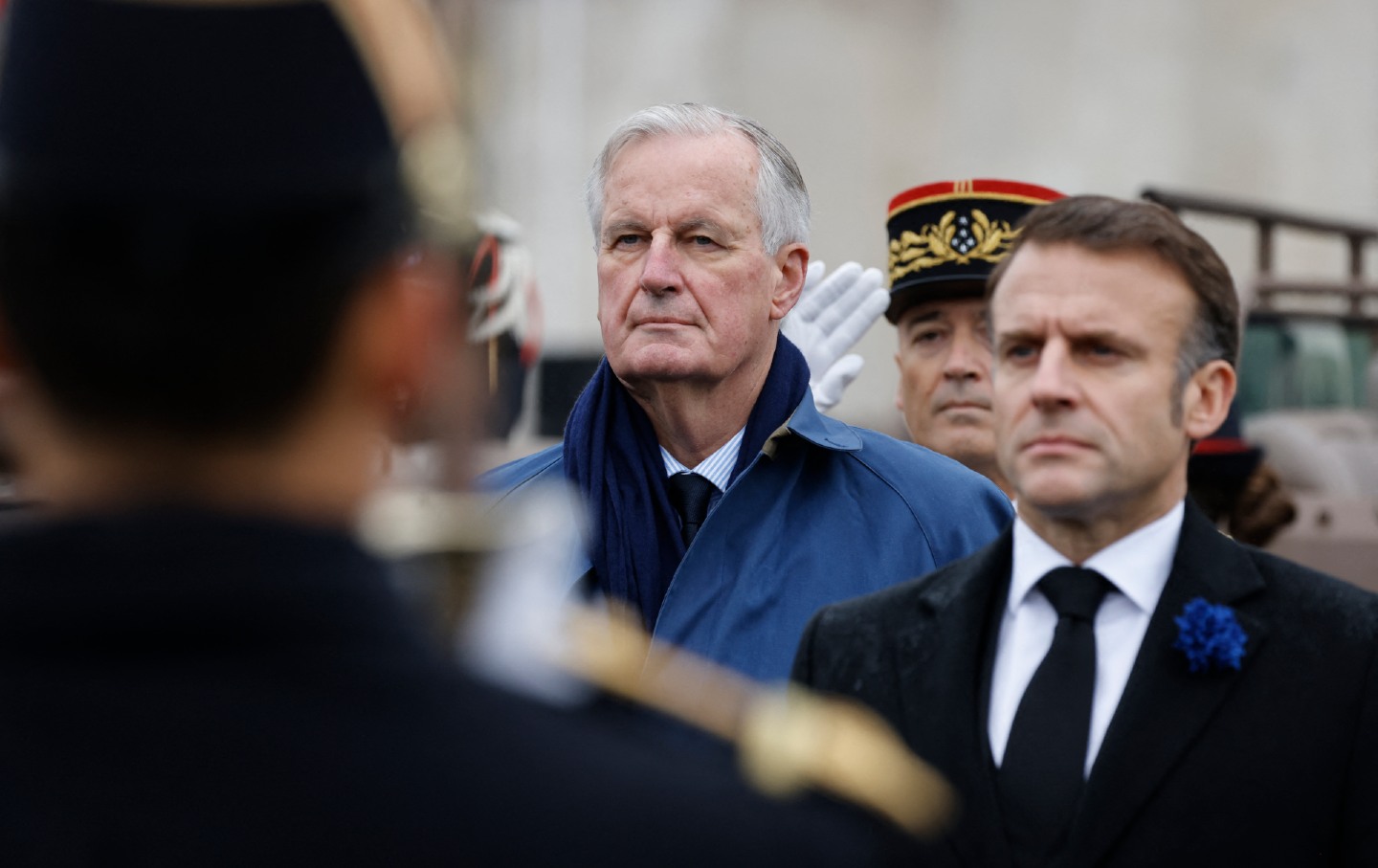Israel’s Assassination Program and Its Ties to US Intelligence
After Israel carried out assassinations in Lebanon and Iran, the prospect of war looms over the Middle East.

The aircraft carrier USS Theodore Roosevelt arrives in Pearl Harbor, Hawaii, April 27, 2018.
(Petty Officer 3rd Class Jessica Blackwell / Navy Public Affairs Support Element Detachment Hawaii / Smith Collection / Gado / Getty Images)Last Saturday, in the early afternoon, the massive US nuclear-powered supercarrier USS Theodore Roosevelt sailed slowly from the Gulf of Oman north into the narrow channel of the Strait of Hormuz. Appropriately nicknamed “the Big Stick,” it was on its way to the Persian Gulf, where it will take aim, like a primed and loaded cannon, directly at Iran. That was the same place it saw action during the Gulf War against Iraq in 1991, supporting aircraft that dropped nearly 5 million pounds of bombs on the country. Now back, it’s once again cocked, loaded with fighter jets, and ready for another bloody war, while escorted by heavily armed destroyers, cruisers, and submarines. To provide additional support for the Roosevelt, last Saturday Defense Secretary Lloyd Austin also ordered to the region the nuclear carrier USS Abraham Lincoln, along with its battle fleet of fighters, destroyers, and cruisers armed with both offensive and defensive ballistic missiles.
But this time it would be different. Instead of a war to rid the region of a brutal Iraqi dictator, it would be a war risking American lives and spending billions of American dollars to support a brutal Israeli prime minister—one facing multiple felony charges in an Israeli court, and numerous charges of war crimes in The Hague. The catalyst for what many fear could soon become a new and deadly regional war was Israel’s recent dual assassinations. The first, in Beirut’s southern suburbs, targeted Fouad Shukr, a senior Hezbollah commander and adviser on military affairs to Hasan Nasrallah, secretary-general of Hezbollah. Also killed was an Iranian military adviser along with three women and two children; at least 74 people were injured.
About a day later, Israel carried out another assassination, this one in Tehran and directed at Ismail Haniyeh, the man leading the negotiations on behalf of Hamas to bring a ceasefire to the long war in Gaza. As the group’s political leader, much of Haniyeh’s extended family had been killed by Israeli soldiers, and now he was among them. For Israeli Prime Minister Benjamin Netanyahu, the murder of Haniyeh, in the works for months, was a big win. Since the start of the war, the Israeli leader had found every opportunity and excuse to delay and frustrate the ongoing peace talks so he could continue the war. “The prime minister has recently foiled the chances of achieving a deal, in part by toughening Israel’s positions in the latest negotiations after Hamas had shown a certain amount of flexibility,” noted Haaretz last week.
Now with the opposing negotiator eliminated, there was nothing standing in the way of his total annihilation of the Palestinian population in Gaza. “How can mediation succeed when one party assassinates the negotiator on the other side?” asked Qatari Prime Minister Mohammed bin Abdulrahman Al-Thani, who had been heavily involved in the talks. Thus, unimpeded by negotiations, the carnage continued. On Sunday Israel unleashed brutal strikes on two schools in Gaza City, where thousands of displaced persons were sheltering, killing at least another 30 Palestinians. An eyewitness to the attack, Osama Labad, told The Washington Post that women and children were among the dead and injured.
On Saturday, Iran informed Arab diplomats that “it didn’t care if the response triggered a war,” reported The Wall Street Journal. Should his decision to murder Haniyeh spark a bloody regional war, Netanyahu was confident that the US would, as always, come to Israel’s defense. “Our support for Israel’s security is ironclad and unwavering against all Iran-backed threats, including Hezbollah,” a State Department spokesperson said, almost robotically.
In fact, the Carnegie Endowment’s Michael Young believes that the rapid one-two timing of the double assassinations “strongly suggests that Benjamin Netanyahu may be trying to railroad the United States into a military confrontation with Iran.” Just prior to the assassinations, Iran’s new reformist president, Masoud Pezeshkian, had been seeking to improve the country’s relations with the West, something very worrisome to Netanyahu.
Only now, as a deadly new war looms on the horizon putting Americans at serious risk, is President Joe Biden beginning to understand how long and how badly he has allowed himself, and the country, to be duped by Netanyahu. “Biden realized that Netanyahu was lying to him about the hostages,” a senior White House official candidly admitted to Haaretz last Saturday. The official was referring to Biden’s speech on May 31 in which he laid out what he said was an Israeli-approved plan for a Gaza ceasefire and a hostage release. But it was neither. Netanyahu had no intention of agreeing to it, leaving Biden to dangle embarrassingly in the wind for months, unable to show any progress at the negotiating table. “He’s not saying it publicly yet, but in the meeting between them, he specifically told him, ‘Stop bullshitting me,’” the official added, referring to the White House meeting with Netanyahu after the prime minister’s address to Congress. The White House official then charged, “Netanyahu is trying to prolong the war instead of focusing on how to get to a hostage deal. It’s making it harder for us to continue supporting Israel over time.” It was an extraordinary series of admissions from a White House normally silent on disagreements with Israel.
Long before the two most recent attacks, Netanyahu had already turned Israel into Assassination, Inc. In Iran alone, Israeli agents have assassinated more than half a dozen scientists and engineers involved with that country’s nuclear program. With no pushback on Israel from the White House, it is apparently expected that Iran should simply accept such violent attacks on its citizens with no retribution. In 2019, for example, Mohsen Fakhrizadeh, a top scientist, was killed by a remote-controlled robot gun that had been concealed at the side of a road outside Tehran.
In a new Middle East war, as in all the previous ones, it would likely be Americans, not Israelis, who would fight and die—especially because of the widespread suspicion that the US was at least aware of, if not behind, the assassinations. Shortly after the murder of Haniyeh, Iran’s Foreign Ministry said it emphasizes US “responsibility” for the assassination because of its support for Israel. And Iran therefore has “the right to respond appropriately against this aggressive action against its sovereignty”—an action that could be directed at US interests both abroad and at home. In a short and seemingly carefully worded statement, US Secretary of State Antony Blinken said, “This is something we were not aware of or involved in. It’s very hard to speculate.”
The problem is, for decades the US and Israel have had highly secret intelligence-sharing arrangements that have included “frameworks” dealing with the topic of providing assistance for assassinations—targeted killings. This was revealed in several Top Secret/Codeword documents leaked by NSA whistleblower Edward Snowden. One, dated March 27, 2006, was written by Cindy Farkus, the NSA’s assistant deputy director for Analysis and Production. It deals with her visit to Israel’s equivalent of NSA, the Israeli SIGINT National Unit (ISNU), also sometimes referred to simply as Unit 8200. In the memorandum, she makes it clear how important the intelligence-sharing relationship has become to both spy organizations, calling it “probably the most important relationship within NSA’s Third Party Program.… It is viewed as the most productive and beneficial Third-Party partnership conducted within the US Intelligence Community.”
Another was written a few months later by an NSA liaison officer temporarily assigned to the ISNU at the time of Israel’s war with Hezbollah. It indicates that the Israelis may have access to the highly classified computer network shared by America’s spy agencies. “ISNU is well plugged in to the USIC [US Intelligence Community] circuit, it was difficult at times to keep a step ahead of them,” the officer says. But in addition to the massive amount of intelligence shared with them, the Israelis kept demanding more, including highly sophisticated geolocation information in order to conduct assassinations, something prohibited by US law. Nevertheless, bowing to Israel’s insistence that it be given an “exemption,” in the end an apparent compromise was worked out:
ISNU’s reliance on NSA was equally demanding and centered on requests for time-sensitive tasking, threat warning, including tactical ELINT [Electronic Intelligence]. And receipt of geolocational information on Hizballah elements. The latter request was particularly problematic and I had several late-night, sometimes tense, discussions with ISNU detailing NSA’s legal prohibition on providing information that could be used in targeted killings. Even with his full understanding of the US situation, BG [Dani] Harari [Commander of the ISNU] sought assistance from NSA for an exemption to this legal policy.… In the end, a framework was decided upon by ODNI [the US Office of the Director of National Intelligence] that defined the parameters and methods of what could and could not be shared with the Israelis.… ISNU stressed their deep gratitude for the cooperation and support they received from NSA.
Considering the over-the-top number of weapons and other support provided to Israel by the Biden administration, it seems highly likely that it would also be given whatever it asked for in terms of intelligence—including targeting and geolocation details as well as human source reporting, all of which could greatly assist in carrying out assassinations. Such actions, however, have serious consequences, including potentially involving the United States in another deadly and prolonged Middle East war. And the longer the genocide continues, the greater the chances of a large-scale regional war, with the US at the center.
Netanyahu deliberately lied to the American president about a hostages-and-ceasefire deal, and then brutally assassinated the other side’s negotiator, possibly with the assistance of US intelligence, so that he could continue his war crimes, assassinations, and genocide. After Israel deliberately and violently has eliminated diplomacy to end the slaughter, the only option left for the United States is coercion. The Biden administration should immediately cut off all weapons and financial aid to Israel, and begin applying harsh sanctions—just as it is doing with Russia over its war in Ukraine. As a lame-duck president, Biden has nothing to lose and a lot to gain, not least of which would be leaving office without a bloody, unending genocide and a potential new Middle East war as his lasting legacy.








